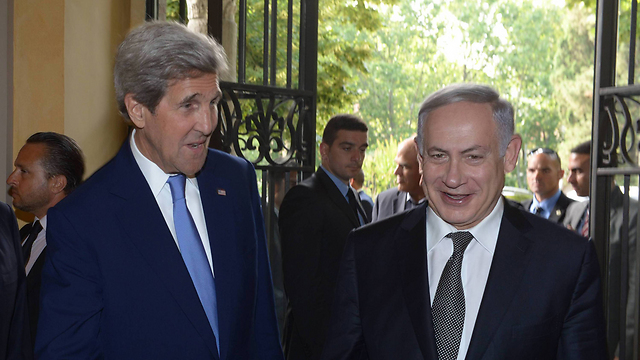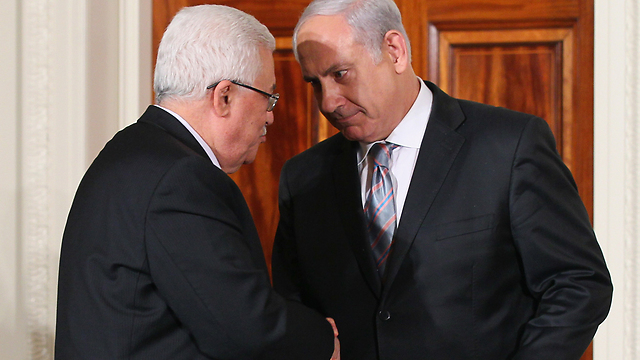
Only a small majority of Israelis, Palestinians support two-state solution
A new poll has revealed that despite this small majority, the two sides distrust each other, have disparate views on the terms of a permanent settlement, underestimate the level of compromise on the other side, and view its intentions as threatening.
Only a small majority of Palestinians (51%) and Israelis (59%; 53% of Jewish Israelis and 87% of Arab Israelis) supports a two-state solution to the Israeli-Palestinian conflict, according to a new poll released on Thursday.
"Palestinian-Israeli Pulse: A Joint Poll" was published by the Israel Democracy Institute in Jerusalem and the Palestinian Center for Policy and Survey Research in Ramallah.
The poll, which surveyed 1,270 Palestinians and 1,184 Israelis, focused on the public’s views on a permanent peace agreement, ability to trust and compromise with the other side, and mistrust and fear of the other.
When presented with a peace agreement package based on that from previous rounds of negotiations, only 39% of Palestinians and 46% of Israelis (39% of Israeli Jews and 90% of Israeli Arabs) said they support such a package. The package included a de-militarized Palestinian state, Israeli withdrawal to the Green Line with equal territorial exchange as relevant, a family unification in Israel of 100,000 Palestinian refugees, West Jerusalem as the capital of Israel and East Jerusalem as the capital of Palestine (the Jewish quarter and the Western Wall under Israeli sovereignty and the Muslim and Christian quarters and the Temple Mount under Palestinian sovereignty), and the end of the conflict and claims.
Support for this nine-point peace agreement package is higher among secular Israeli Jews (56%), compared to traditionalists (35%), religious (10%) and ultra-Orthodox (9%). Similarly, more Palestinians who define themselves as “not religious” (63%) or “somewhat religious” (41%) support the peace agreement package, compared to those who define themselves as religious (35%). Support among Israelis who define themselves as left and moderate left is highest (84%) compared to center (59%) and right and moderate right (18%). On the Palestinian side, some 57% of Fatah voters support the agreement, compared to 25% of Hamas voters and 46% of voters for other factions.
Significantly, one-quarter of Palestinians and Israelis who opposed the peace agreement package said they would change their minds and support for the package if the agreement includes a wider or regional Arab-Israeli peace.
When asked about their readiness for mutual recognition of national identity of their respective states as part of final status agreement, a majority (64%) of Israelis and a minority (43%) of Palestinians support mutual recognition.

Who should broker a peace agreement?
Palestinians (44%) prefer a multilateral negotiations process. Israelis (40%) prefer bilateral negotiations. If posed with multinational negotiations, both Israelis (28%) and Palestinians (22%) would prefer support from an Arab forum (Saudi Arabia, Egypt and Jordan).
All other multilateral forums—American-led (Israelis 26%, Palestinians 8%), EU-led (Israelis 7%, Palestinians 20%), or UN-led (Israelis 12%, Palestinians 22%)—are acceptable to one side while unacceptable to the other.
When asked why they believe previous rounds of negotiations failed, a majority of Palestinians (62%) blame the Israelis, while a majority of Israeli Jews (52%) blame the Palestinians. Likewise, only 43% of Palestinians and 43% of Israelis believe the other side wants peace.
Perception of the Other
There is little trust between Palestinians and Israelis. Some 89% of Palestinians feel Israeli Jews are untrustworthy, while 68% of Israelis Jews expressed similar sentiments. Further, 50% of Israeli Jews, 61% of Israeli Arabs and 70% of Palestinians agree with the statement, “Nothing can be done that’s good for both sides; whatever is good for one side is bad for the other side.”
On a related note, 54% of Palestinians think that Israel’s goal is to extend its borders to cover all areas between the Jordan River and the Mediterranean Sea and expel its Arab Palestinians. Some 27% think Israel’s goal is to annex the West Bank and deny political rights to the Palestinians. Among the Israelis, 35% (40% of Israeli Jews and 8% of Israeli Arabs) think Palestinians’ main aspiration is to conquer the State of Israel and destroy much of its Jewish population; 19% think the goal of the Palestinians is to take over the entire State of Israel.
Strikingly, the two sides perceive much more moderate aspirations on their side. Only 12% of Israelis say the aspiration of Israel is to annex the West Bank and expel the Palestinians living there. Among Palestinians, only 10% say that the Palestinian aspiration is to conquer the State of Israel and destroy much of its Jewish population.
Israelis say they fear Palestinians (65%). In contrast, 54% of Palestinians say they do not fear Israeli Jews.
A majority (68%) of Palestinians look up to Israeli democracy, seeing it as “good” or “very good,” while only 10% of Israelis see Palestinian democracy positively, with 77% describing it as “bad” or “very bad.” When asked about the chances that a better democratic system will be established in a future Palestinian state, the majority of Israelis (83%) say the chances are “slim” or “very slim.”
A large minority of Palestinians perceives the situation in Israel as good (49%) and conditions in their own community (West Bank 43% and Gaza Strip 72%) as bad. Israelis perceive the situation similarly, describing Palestinian conditions in the West Bank as bad (43%) and conditions in Israel as good (39%) or at least so-so (36%).
The poll was carried out in partnership with and support from the Konrad-Adenauer-Stiftung and with funding from the European Union.











